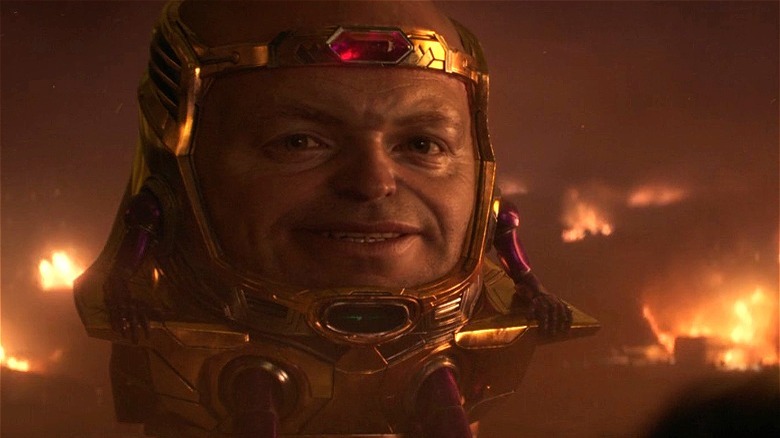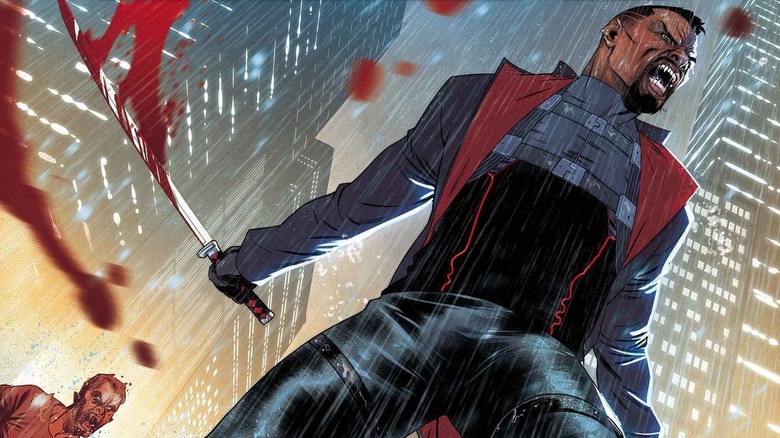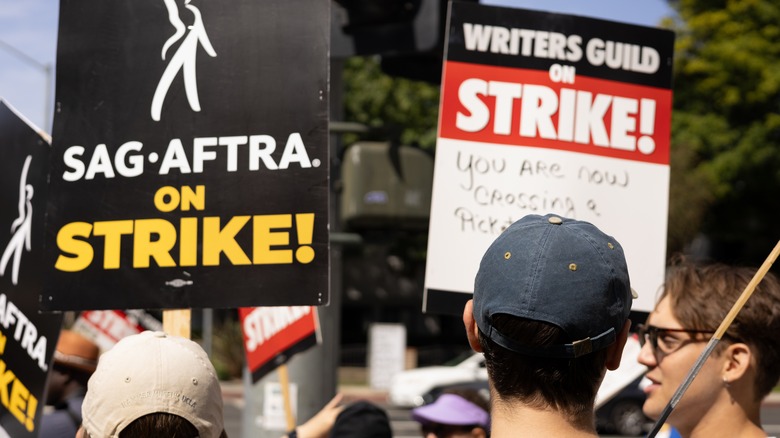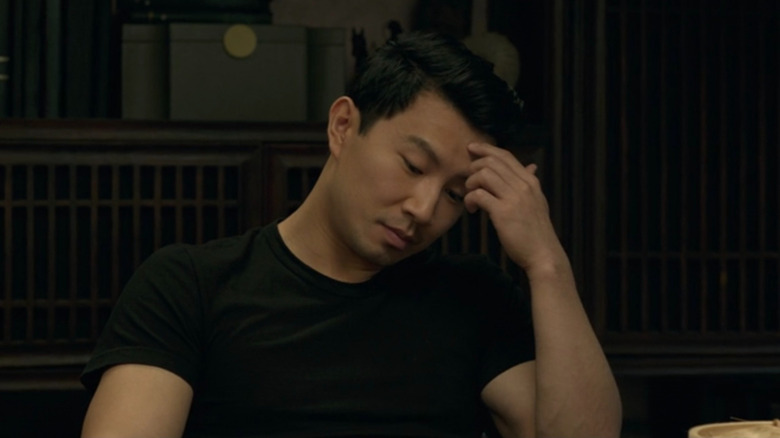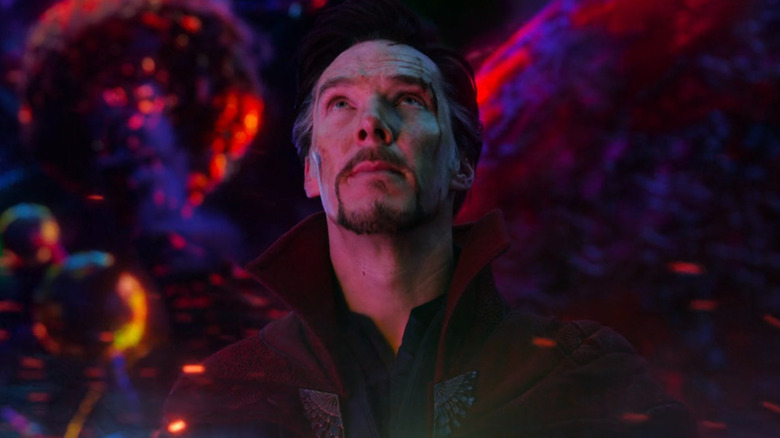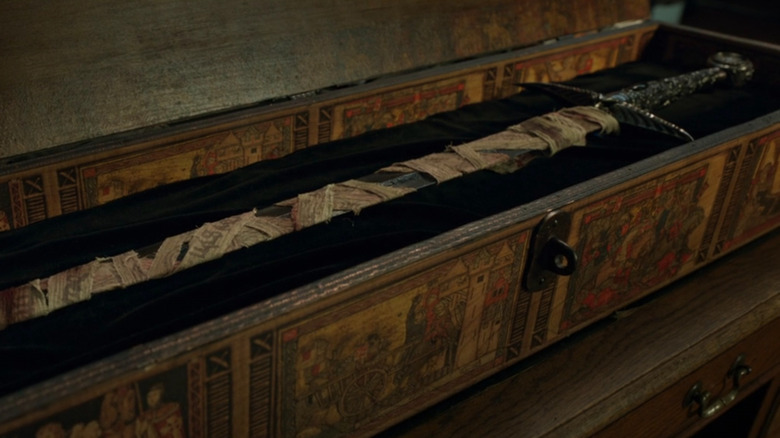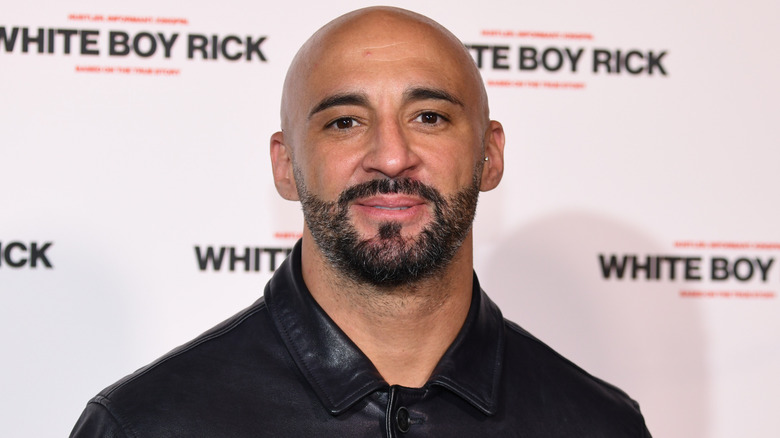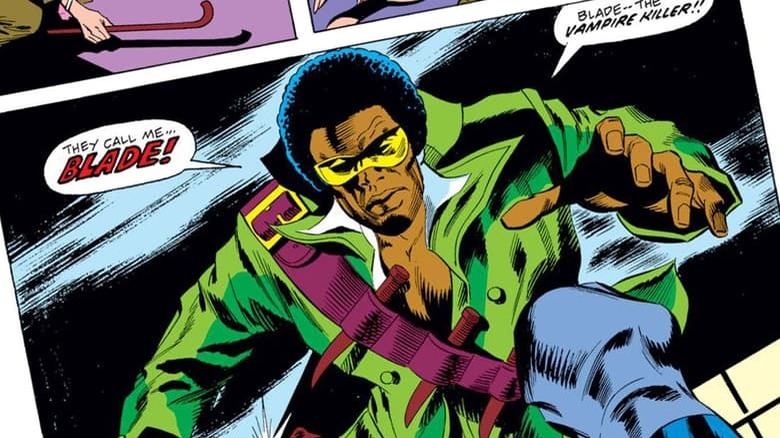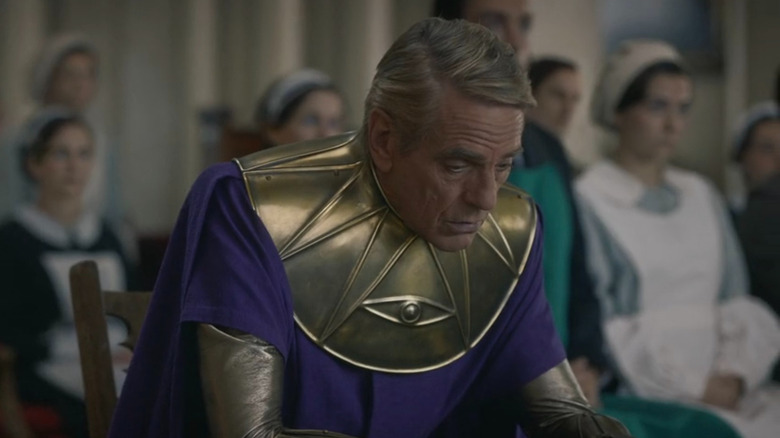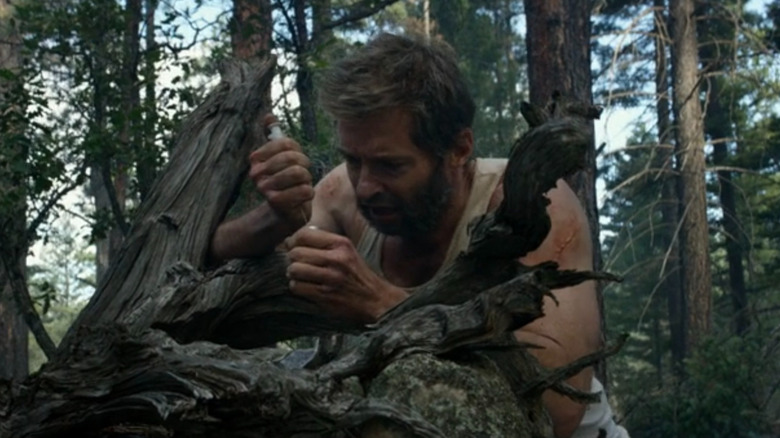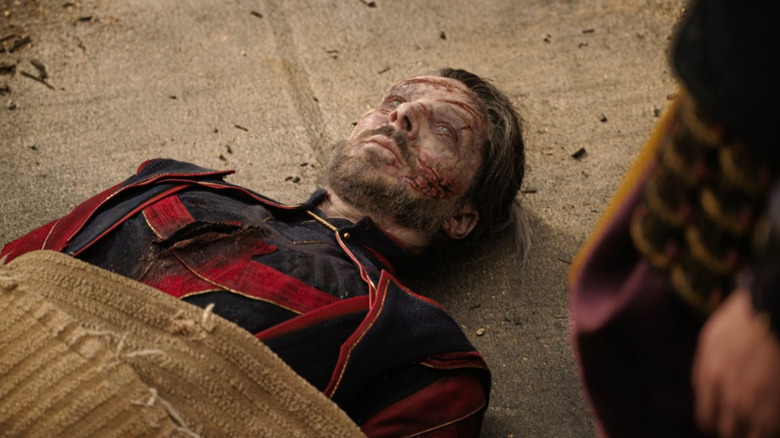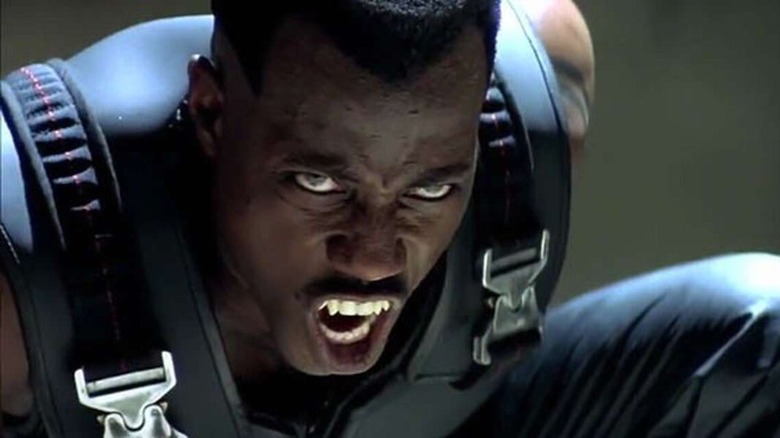Why We're Worried About Marvel Studios' Blade
"I want to leave you today with one more thing, that I don't think has been rumored about," teased Kevin Feige on the stage of San Diego Comic Con, surrounded by the brightest stars of Marvel's then-promising future. "Ladies and gentlemen, two-time Academy Award winner Mahershala Ali!"
It's been a surprisingly long time since this moment happened in 2019 (so long ago that you probably don't remember that Ali rather awkwardly remained completely silent, as though Marvel were paying him by the word to be there). But if you're able to watch the video online, you'll hear the deafening screams of fans who couldn't be more thrilled by the official introduction of Ali as Blade into the Marvel Cinematic Universe.
Four years later, the mood is quite different. A pandemic and several critical and commercial failures later, "Blade" is still a distant and uncertain prospect for the MCU. After numerous work stoppages, delays, creative firings, and consistent rumors that Ali is unhappy and willing to walk off the project, the only objectively positive thing one can say about "Blade" is that its $100 million budget might be low enough to avoid complete catastrophe. Here's why we're concerned.
The Marvel Cinematic Universe is on the decline
Much hay was made of a report earlier this year which alleged that Marvel Studios was a tinderbox waiting to catch fire the moment Jonathan Majors is (pending a guilty verdict) sentenced in his assault trial. While this assessment may have been a little extreme (Kang the Conqueror can always be either recast or replaced), it would also be disingenuous to imply that the MCU is as strong as it's ever been.
Even ignoring box office statistics (dubiously useful as a measure of success after a pandemic and two historic labor strikes), the general consensus among the critical community is that Marvel movies have declined significantly in quality since "Avengers: Endgame." Audits of review aggregation websites over the past two years found that critics had been harsher on more recent entries in the MCU. For what it's worth, Phase Four specifically also received poor marks from audiences on both IMDb and Metacritic.
Based on this trend, "Blade" has a significantly higher chance of being met with less favorable reviews than earlier Marvel films. In this circumstance, and if you find yourself agreeing with the critical community's recent assessment of the MCU, this would likely mean you didn't enjoy "Blade" too much — and if you don't agree with them, lukewarm reviews can still do damage to a film's box office potential.
Marvel Studios has been working on Blade for over 10 years
The year is 2013. Robert Downey Jr. is in negotiations for a second "Avengers" film; malicious money-man Ike Perlmutter is still in charge of Marvel Entertainment; beloved genre filmmaker Edgar Wright is still supposed to direct "Ant-Man"; and entertainment outlets are praising the studio's frugal decision to hire "low-cost" actor Chris Pratt and "low-budget filmmaker" James Gunn for an upcoming film based on an obscure comic book series called "Guardians of the Galaxy." It's an era almost unrecognizable to contemporary MCU fans, one defined by a tempered excitement that inspired both strategic expansion and cost-conscious development maneuvers.
A byproduct of this era was the infamous Marvel writers' program, a group of mostly up-and-coming screenwriters hired by the studio to generate ideas and spec scripts for their desired properties. Almost every Marvel comics character or team confirmed at the time to have had a script written about them in this development lab — from Doctor Strange and Black Panther to Ms. Marvel and The Runaways — has eventually found their way into headlining a major MCU project. That is, every one but Blade.
Despite being in development for a decade at Marvel Studios, a "Blade" film has failed to cross the finish line. Given the amount of heroes flooded into the franchise before the famous vampire hunter, it's hard not to see this extended delay as indicative of a lack of confidence in the character.
Production has been delayed and shut down multiple times
For a big budget franchise film like "Blade," efficiency and cohesion during production are imperative to ensuring the film achieves the quality desired by the studio. It's not a great sign at all, then, that "Blade" has experienced multiple extraordinary production hiccups, including two work stoppages. The first came in October 2022 (three years after the film had first been announced at San Diego Comic-Con) when scheduling challenges (and possibly creative differences) led to the departure of the film's original director, Bassam Tariq. With a November 2023 release planned, this was a dire setback that left the project rudderless 13 months out from the premiere.
Pre-production quietly got back underway in spring 2023 under new director Yann Demange, with the studio now reportedly angling for a September 2024 release. That was, until the Writers Guild of America went on strike, leaving Demange and producer Kevin Feige without the ensemble of writers they'd been working with to get the film back on track. Production shut down once more, and a month later the premiere was delayed to February 2025 — and after the SAG-AFTRA strike further hindered its ability to move forward, the premiere was delayed yet again to November 2025. Though we won't know for certain until the film finally arrives, a production process spanning potentially three years is seldom a gift to a project with so many moving parts. It's hard to imagine that audiences won't see evidence of this protracted production in the final product.
It has been slated for multiple dump months
The best evidence of a studio's faith in a project is often its slated release month. A summer or holiday release can indicate that they predict a particular film will be a huge box office draw, while a release in the beginning of the year or the weeks after Labor Day can mean they want a destined dud to fly under the radar (while not wasting a better date). So far, "Blade" has been given three release months in three separate years — two of these months are so bad for films, they're commonly referred to as "dump months."
February and September are generally considered to be months during which studios put out films they don't have much faith in, either critically or commercially. Marvel Studios has released only two films in February — "Black Panther" (a critical and commercial success strategically given this release window to coincide with Black History Month) and "Ant-Man and the Wasp: Quantumania" (a critical failure as well as an unmitigated box office bomb).
Marvel's sole September release is "Shang-Chi and the Legend of the Ten Rings," which, despite doing incredibly well for a pandemic-era release, was widely considered to have been underestimated by both audiences and the studio (star Simu Liu even criticized former Disney CEO Bob Chapek for calling the film "an interesting experiment"). Again, it's just difficult to see how the House of Mouse would at least initially relegate "Blade" to these unusual months if it had faith in its success.
Blade's new release date isn't looking great either
At press time, "Blade" is currently on its second November release date, and (barring any other unforeseen historical events) is seemingly on track to make that target. In fairness, Disney and Marvel moving it back out of the dump months could indicate that the studio is feeling better about its chances. But even if they aren't setting "Blade" up for failure, they're not exactly setting it up for success either.
November is a tricky month for a Marvel Studios release. The highest grossing MCU film released during this month was "Black Panther: Wakanda Forever," which indisputably crushed it at the worldwide box office and is currently the seventh highest-grossing MCU film domestically. The studio's second-highest November release was "Thor: Ragnarok," which also did fairly well worldwide. It's worth noting, however, that both of these films were direct sequels to previously successful MCU properties.
Other Marvel November releases: "Thor: The Dark World," "Doctor Strange," "Eternals," and this year's "The Marvels." These films are largely not the shining jewels of Marvel's gauntlet in terms of either box office or critical reception. By sending "Blade" out in November, the studio seems to be aiming for a decent, "Doctor Strange"-level haul at best — but given how dismal November 2023 has been for film, it's doubtful they'll get it.
Blade is only connected to one other MCU movie
The MCU's second-poorest-reviewed film, "Eternals" is still the odd duck of the MCU. The 2021 Chloé Zhao-directed epic was so insulated from the rest of the franchise that within the film there were almost as many references to DC characters as there were other Marvel characters, and outside the film no one who lives in the MCU acknowledges the world-changing events that took place (if there were a planet-sized god living inside the Earth, surely one of the Avengers would have noticed it). The only way "Eternals" is meaningfully connected to the wider MCU is through its post-credits scene, which features the voice-only debut of Mahershala Ali's Blade.
In addition to the fact that a voiceover cameo is pretty weak as far as post-credits reveals go, it's hardly a positive omen that the lead-in for "Blade" is a film that came out four years before and was Marvel's first "rotten"-rated release. More troubling still is that, despite having the opportunity to tease "Blade" in supernatural projects like "Moon Knight," "Doctor Strange in the Multiverse of Madness," or even "Werewolf by Night," Marvel has left the film's sole connective tissue to a movie even the studio doesn't seem keen on remembering.
Yann Demange has a mixed record in feature films
Of all Marvel's Phase Six directors, arguably no one has as difficult or thankless a job as Yann Demange. The 46-year-old French filmmaker was brought in to direct "Blade" a year before its original release after previous director Bassam Tariq was forced to depart. And while Demange has more experience than his relatively fresh-faced predecessor (Tariq only had one feature film under his belt when Marvel hired him), his track record remains inconsistent.
Demange's debut was the independent British film "'71," a blistering war thriller set in Northern Ireland during the stretch of time known as "The Troubles." Despite bombing at the box office (mostly due to a rather sizable budget for an indie film), "'71" was a critical success that netted Demange the Best Director prize at the 2014 British Independent Film Awards. On the other hand, his second and most recent film, "White Boy Rick," failed to turn a fascinating true story and a killer performance from Matthew McConaughey into either a critical or commercial success.
At the risk of over-simplifying things, Marvel — admittedly in a moment of crisis — gave "Blade" to a director whose previous two films failed to make good on their budgets (which is bad news for the studio) and who once wasted both rich source material and an Academy Award-winning actor (which is bad news for fans).
Blade doesn't have many iconic comic book storylines
In any great comic book movie, fans can always see flashes of at least one storyline that inspired it. James Mangold's "Logan" draws significant inspiration from Mark Millar and Steve McNiven's "Old Man Logan," for example. Whether your favorite Batman is Christian Bale, Ben Affleck, or Robert Pattinson, you still have specific comic book storylines to thank for their movies. Now, take a moment to think: what is your favorite "Blade" comic book storyline?
Based on answers we've found from comic book fans online, chances are you thought of either his appearance in Marv Wolfman's "Tomb of Dracula" (a great but single issue from an era in which Blade is basically unrecognizable to today's casual moviegoing audiences) or the 2000s maxi-series "Undead Again." The Marc Guggenheim-Howard Chaykin collaboration is perfectly fine, but it's a uniquely quiet entry among "Blade" storylines, keeping the character far from the level of action or spectacle that the MCU clearly prefers.
While it's true that the original "Blade" screen trilogy was so different from the comics that it actually influenced the look and tone of future "Blade" stories (including "Undead Again"), this is only further proof that the "Blade" comic book well is unusually dry. That only half of Blade's 50-year comics history is remotely recognizable to fans provides a uniquely difficult challenge for Marvel at a time when it's struggling with characters like Thor and Ant-Man.
A script from a Watchmen writer was completely abandoned
Over the past 10 years of comic book film and television history, no team has faced as tough a task as those who took on the making of HBO's "Watchmen" sequel. The limited series (helmed by "Lost" co-creator Damon Lindelof) aimed to continue one of comics' most beloved and sacred stories, while reviving and remixing fan-favorite characters along the way. That the project turned out to be as audacious and well-received as it was is a feather in the cap of anyone who helped bring it to life. This includes writer Stacy Osei-Kuffor, who was tapped shortly thereafter to bring "Blade" to life, before she was unceremoniously replaced and her work on the project tossed aside.
Admittedly, we can't judge the quality of her "Blade" screenplay — perhaps the studio really needed an entirely different writer to pen a brand new script. But Osei-Kuffor's previous work makes that frankly hard to believe. Her resume is uniquely diverse among the studio's current ensemble of writers, having written for the hidden-gem TV adaptation "Happy!," the off-the-wall sitcom "PEN15," and the acidic Apple TV+ drama "The Morning Show." While she obviously doesn't need to rely on Marvel for work (she most recently wrote for the second season of the critically acclaimed Hulu series "The Bear"), it really seems like they could have benefited from continuing to collaborate with someone as versatile and proven as Osei-Kuffor.
Marvel Studios is now relying on a revolving door of Blade writers
The first writer hired to replace Stacy Osei-Kuffor was Michael Starrbury, who joined "Blade" in November 2022. Starrbury — who earned an Emmy nomination for his work on "When They See Us" — was then allegedly replaced by occasional "Witcher" and "Star Trek: Strange New Worlds" scribe Beau DeMayo. (DeMayo also wrote one episode of Marvel's Disney+ series "Moon Knight," and is currently leading efforts on the upcoming "X-Men '97"). Then, in April 2023, Marvel made the auspicious decision to hire "True Detective" creator Nic Pizzolatto for yet another revamp.
Slightly less auspicious, however, are reports that the studio hired Michael Green to revise Pizzolatto's work. Though his collaborations with other writers and directors have resulted in the critically acclaimed films "Blade Runner 2049" and — most importantly for Marvel's purposes — "Logan," Green's resume also includes 2011's "Green Lantern," "Jungle Cruise," and "The Call of the Wild." The only projects on which he bears the sole writing credit are Kenneth Branagh's three Agatha Christie films.
This revolving door serves as the backdrop to rumors that the writing process for "Blade" has been so fraught that Mahershala Ali has debated dropping out of the project entirely. As far back as September 2022, it was reported that Ali was "very frustrated" with the script, and rumors of his potential exit a year later have done little to contradict that.
Can Marvel really make a superhero horror movie?
The idea of a "superhero horror movie" is one that is often bandied about as though it has yet to be executed effectively. To a certain degree, this is true — the most earnest stab a studio made at producing such a project was Fox's "New Mutants," which ... we don't really have to talk about that, right?
But it would be wrong to say that Marvel has avoided the genre entirely so far. Both "Doctor Strange" films adopt the aesthetics of horror in minor ways, as do "Werewolf by Night" and certain elements of "Moon Knight." There are also examples of horror-flavored superhero fare outside Marvel Studios, including the original "Blade" trilogy. The trouble is, Marvel Studios still hasn't been able to crack the fundamental challenge a superhero horror movie poses.
To evoke the desired feelings of fear and dread that the horror genre aspires to, a story must feature a protagonist that's at a severe disadvantage to the horrifying forces they're up against. When this protagonist is the (former) Sorcerer Supreme or, say, an immortal vampire-hunter, the director's horror toolbox becomes constrained to bland tactics like gore and jump scares. If that's all "Blade" has to offer, it will struggle to stand out from other Marvel properties — especially the original "Blade" films.
It will always be compared to the original Blade trilogy
In the same way that Jon Watts' "Spider-Man" films always get compared to Sam Raimi's and even Marc Webb's, the MCU "Blade" will always be compared to the original trilogy. The first installment, released in 1998, was directed by Stephen Norrington and written by future "Dark Knight" trilogy scribe David S. Goyer, receiving mixed-to-negative reviews from critics. Even so, the films are regarded as cult classics and have arguably had more staying power in terms of cultural relevance than some other early 2000s superhero flicks.
Sure, one could easily dismiss the affection fans have for the "Blade" trilogy as mere nostalgia, but that doesn't change how those same fans will react when Marvel Studios attempts to court them in November 2025. If they could make something even remotely as impactful as the first three films, Marvel would be incredibly lucky. But — in the iconic words of Wesley Snipes' character — "some motherf***ers are always trying to ice-skate uphill."

